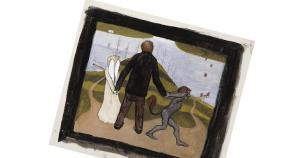 “The Devil made me do it.”
“The Devil made me do it.”
A cheeky television catchphrase from my boyhood begged indulgence, because the naughty acts could not be helped: “The Devil made me do it.”
Nonsense.
Devils exist, but if they make us do something, this is only because we gave them permission to act earlier. Devils are powerless against the Almighty, and those created in His Image need not suffer from demonic control. Like Sauron in Lord of the Rings, they can whisper and tempt, but they cannot force a soul to sin, especially at the first. We can consent, give up our wills to these intelligences, but we need not have.
A devil may make us do it now, but the fiend could have done nothing, if we had not said “yes” long before the deed. I hate some deeds I have done, but I did them: not devils, God forgive me. We long to escape responsibility by pushing off our choices to “them.”
The controlling facts need not be diabolical, they might be parents, society, culture, any thing or being that can, somehow, take the blame for our choices. Naturally, there are many forces that make bad choices more likely: poverty, lack of family, injustice in society toward us. This is real, but we dare not strip any person, even ourselves, of true humanity by pretending that free choice was not possible.
Society did not make me do it. Society may have made it more likely that I do it, tempted me to do it, lured me to do it, but I chose. That is what it is to be human. There is no mercy in shifting the blame to some other force if the shift reduces a man to a slave. We should defend our basic humanity, the power of free choice, even at the cost of owning up to our faults, our own grievous faults.
The demons cannot make us do anything, at least not anything for which we are morally responsible. If we cannot choose, then we are not guilty. If we chose, then we are guilty, even of the distant choices that flow from that first poisoned choice.
One of the first philosophers, Heraclitus, saw the world as it was: full of change, but with an enduring order- a divine Logos. He believed in God, but not in the gods: knowing that many of them were just images of our own nature. If the gods did exist, they were not fit for a philosopher’s worship. Heraclitus observed the excuse making of men: the Devil made me do it. More subtlety, he also saw that we blamed “forces” (Greek term: daimons) for our troubles.*
He put is succinctly:
247 Man’s character is his daimon.
We first make a home and then invite the relevant daimon in to dwell. Our character is our daimon.
Saint Basil or Blessed Augustine, Christians have known that the noble pagans, those before Christmas in the Greek world, knew things. We could learn from those like Heraclitus. So we did, have, and always shall.
———————————-
*The similarity between the term “demon” and “daimon” is tricky. A demon is always evil, a daimon merely a power. To help distinguish the two almost sound alike: recall that Socrates had a daimon, a spirit of the great good God, that checked him from doing evil. Nobody should want a demon!












